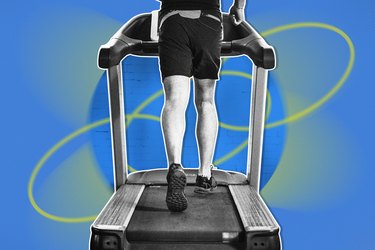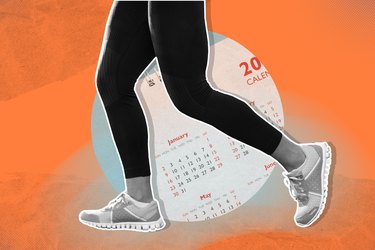
With the rise of intermittent fasting came a lot more talk about exercising in a fasted state. But what exactly is a fasted workout?
It's pretty much what it sounds like: Working out without eating or drinking anything in the last eight hours (at least).
Video of the Day
Video of the Day
In general, fasting can have lots of benefits including improvements in health conditions like obesity, heart disease and certain cancers, according to a February 2020 article from the National Institute on Aging.
However, working out in a fasted state is another story. Here, we take a deeper dive into what happens to your body when you do a fasted workout in an attempt to answer the question: Are fasted workouts good or are fasted workouts bad?
How Your Body Uses Fuel in a Fasted State
In order to understand what happens to your body during a fasted workout, it's important to know how your body breaks down food to fuel exercise. When you eat something, your body breaks down the food and stores carbohydrates in the form of glycogen, which is a quick source of energy, according to the American Council on Exercise.
But if you haven't eaten anything in hours, your body will tap into more fat as a source of fuel compared to carbohydrates, says Marie Spano, RD, CSCS, sports dietitian and author of Nutrition for Sport, Exercise and Health.
"If you eat soon before you work out, your body will utilize the carbohydrate you just ate during your workout," Spano says.
Keep scrolling to learn all about how the lack of carbs for fuel affects your body.
1. You'll Burn Some Fat
One of the most popular reasons people turn to fasted workouts, especially fasted cardio workouts, is because you burn some fat.
"The primary fuel source for low- to moderate-intensity exercise is carbs plus fat but for high-intensity exercise, it is exclusively carbs," says Leslie Bonci, RD, CSSD, founder of Active Eating Advice and sports dietitian for the Kansas City Chiefs and Carnegie Mellon University athletics.
"So in the absence of adequate carbs, the body will start by breaking down fat." This can temporarily cause a reduction in your body fat percentage but it isn't a significant enough reduction to notice a difference on the scale.
2. Your Weight May Remain the Same
While you might think fat loss should equate to weight loss, that isn't necessarily the case when it comes to fasted workouts.
"Fasted workouts do not help with weight loss. Fasting before cardio leads to more fat used as a source of fuel compared to carbohydrates. However, what matters for weight loss is total calories burned versus consumed over time," Spano says. "So the goal for your workout should be to burn as many calories as you can if fat loss is your goal."
For example, you can increase the calorie burn of your treadmill workouts by incorporating inclines and intervals. And if you're strength training, try lifting heavier weights and adding more reps.
3. Your Muscles Could Break Down
When training at a moderate intensity in a fasted state, your body first turns to fat as its fuel source in the absence of carbs.
However, if you're doing high-intensity exercise of 60 minutes or more, your body may have to turn to muscle, breaking it down into amino acids that can be synthesized into glucose for fuel, according to Bonci. In other words, you could lose muscle from doing fasted workouts.
"Exercising in a fasted state means the body has to break down muscle to generate fuel for the exercising muscles," Bonci says. "So, even though you can burn more fat exercising in a fasted state, that does not mean you will necessarily lose weight, and it may not change your overall body composition."
That's why the type of workout you do in a fasted state matters, according to Kien Vuu, MD, assistant professor of health sciences at UCLA.
"If your goal is muscle building, there is a potential for muscle loss if you're trying to do a muscle-building workout in the absence of amino acids, specifically leucine [which is essential for protein synthesis aka muscle growth]," Dr. Vuu says.
That said, amino acids make up only a small percentage of calories burned during a workout, Spano says. So if you want to build muscle and are working out fasted, it's important to get enough protein and calories after your workout.
"If you're doing mainly cardio and underconsuming protein and calories, you'll lose muscle over time. But exercising in a fasted state means you will have a temporary imbalance, where muscle breakdown is greater than muscle building," Spano says. "As soon as you eat protein, your body will be in an anabolic or muscle-building state. One single exercise session won't matter, but your patterns over time will matter."
4. Your Mental State Can Take a Hit
While some people find fasted workouts enjoyable, not everyone has the same response. Because doing fasted workouts means your blood sugar levels are already low, your mood might be affected.
"Some individuals feel calmer and more focused when working in a fasted state, whereas others feel more anxious and antsy as a result of fasting," Bonci says. "Fasting can cause a decrease in blood glucose, which can temporarily affect mood and concentration, but this is corrected after eating."
If you try a fasted workout and you're not feeling like yourself or it's negatively affecting your mood, you're better off eating before your sweat session.
5. Your Body Might Take on Too Much Stress
Dr. Vuu doesn't recommend fasted high-intensity workouts because they are both major stressors on the body. Although your body does well dealing with short-term stress, too much stress at any given time or long term can lead to health issues, such as diabetes, heart disease or high blood pressure, according to the Mayo Clinic.
That's why it's important to listen to your body before applying additional stress on your body, Dr. Vu says.
Whenever introducing a new stressor, such as fasting, start off slow and listen to your body's response before increasing the intensity of that stress.
"A HIIT workout could be performed fasted, however, the same principle would apply — to start with a more gentle- intensity workout and work your way up," Dr. Vuu says. "Any additional stress on top of fasting — such as poor sleep, nutrition, work stress — should also be considered as well."
In other words, if you are, in fact, feeling good after a fasted high-intensity workout, you can continue to do them as long as you feel OK. If you start feeling unwell or find you aren't able to recover properly, lessen your intensity. After all, everyone is different.
6. Your Performance Might Take a Toll
Although tapping into your fat stores for fuel won't affect your performance, not having readily available carbohydrates compromises how long you can sustain high-intensity exercise, Spano says.
That's because unlike carbohydrates, which are a fast fuel source, fat takes longer for your body to break down. So your need for calories during high-intensity exercise outpaces how quickly your body is able to utilize fat for energy, Spano explains.
"There is no evidence it [fasted workouts] can improve your overall fitness level, particularly performance," Sean Ruff, NASM-PES, a nutrition coach and exercise physiologist, tells LIVESTRONG.com. "However, if it does yield fat loss for some, that would be a positive step in the right direction toward improving said fitness levels from a body composition standpoint."
While fasting won't necessarily aid performance, some people may feel better working out on an empty stomach.
"For those who experience upset stomachs exercising in a full state, exercising on empty may be less of a distraction and someone may feel they are able to work harder and more efficiently," Bonci says. "My best advice: Try it out, keep track of how you feel, how your body responds and your performance gains, and make sure that you still meet your nutrition goals as well as hydration needs over the course of the day."
7. You May Be Ravenous Post-Workout
Because you're exercising on an empty stomach and using stored fat and muscle you have for fuel, you may feel much hungrier post-sweat session.
"If someone exercises in a fasted state and finds themself hungrier post-workout, they may end up consuming more calories [than what they need]," Bonci says. "This could mean your overall caloric intake could increase, which would lead to the opposite of weight loss."
8. You May Feel Lightheaded
If you're working out in a fasted state and you start to feel faint or lethargic, stop exercising and eat something to get your blood sugar levels back up.
"Fasted cardio may induce lighted-headedness in particular exercisers who may be novice to using this method or exercisers who just can't tolerate exercise without a pre-workout meal," Ruff says. "Light-headedness during fasted cardio is a sign of further decreased blood sugar, which could serve as a precursor to a fainting episode."
People who have a past or current history of an eating disorder, live with diabetes or hypoglycemia (having lower blood sugar levels than the healthy range) or are over 65 should consult their doctor before trying a fasted workout, Spano says.
"Fasted workouts are generally characterized by exercisers undergoing exercise in a state of glycogen depletion and, consequently, lower levels of blood sugar," Ruff says. "An exerciser who is hypoglycemic risks hypoglycemic shock, which can be characterized by dizziness, slurred speech, blurred vision and shaking."
Warning
If you have diabetes or are taking insulin, you shouldn’t exercise in a fasted state before talking with your doctor, says Angela Fitch, MD, chair of Jenny Craig’s science advisory board and co-director of Massachusetts General Hospital Weight Center.
The Bottom Line
Overall, the science simply doesn't support fasted workout benefits, so there's no real reason to try them, other than you may feel better exercising on an empty stomach.
In fact, fasted workouts might not make much of a difference in your fitness goals, or worse, be a detriment to them. And if you live with a health condition, such as diabetes or hypoglycemia, you risk your blood sugar levels becoming dangerously low, so make sure to check with your doctor before you make any changes to your workout routine.
"There is not a lot of data on human performance and fasting other than in athletes," Dr. Fitch says. So, the research may not apply to everyone.
- American Council on Exercise: "The Real Impact of Carbs"
- Mayo Clinic: "Stress symptoms: Effects on your body and behavior"
- National Institute on Aging: "Research on intermittent fasting shows health benefits"
- Strength and Conditioning Journal: "Fasted Versus Nonfasted Aerobic Exercise on Body Composition: Considerations for Physique Athletes"



